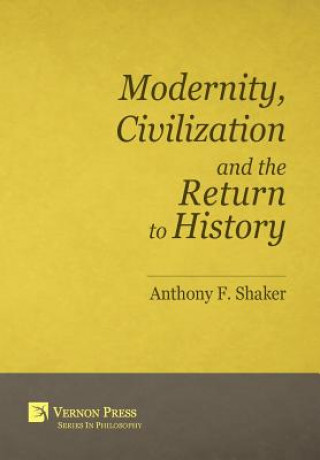
Kód: 15815119
Modernity, Civilization and the Return to History
Autor Anthony F. Shaker
The modern concept and study of civilization have their roots, not in western Europe, but in the spirit of scientific investigation associated with a self-conscious Islamicate civilization. What we call modernity cannot be fathome ... celý popis
- Jazyk:
 Angličtina
Angličtina - Vazba: Pevná
- Počet stran: 586
Nakladatelství: Vernon Press, 2017
- Více informací o knize

Mohlo by se vám také líbit
-

Dune
216 Kč -

Haunting Adeline
621 Kč -

Berserk Deluxe Volume 2
1092 Kč -

White Nights
89 Kč -

Powerless
268 Kč -

Atomic Habits
330 Kč -

Dune Messiah
228 Kč -

Berserk Deluxe Volume 3
1142 Kč -

One Day
221 Kč -

Berserk Deluxe Volume 1
1115 Kč -

Iron Flame
368 Kč -

Surrounded by Idiots
213 Kč -

Harry Potter and the Prisoner of Azkaban (Minalima Edition)
993 Kč -

Gravity Falls Journal 3
443 Kč -

Heaven Official's Blessing: Tian Guan Ci Fu (Novel) Vol. 1
440 Kč -

The Creative Act
568 Kč -

Dune
276 Kč -

Hunting Adeline
624 Kč -

A Little Life
290 Kč -

Children of Dune
230 Kč -

Heaven Official's Blessing: Tian Guan Ci Fu (Novel) Vol. 2
427 Kč
Darujte tuto knihu ještě dnes
- Objednejte knihu a zvolte Zaslat jako dárek.
- Obratem obdržíte darovací poukaz na knihu, který můžete ihned předat obdarovanému.
- Knihu zašleme na adresu obdarovaného, o nic se nestaráte.
Více informací o knize Modernity, Civilization and the Return to History
Nákupem získáte 267 bodů
 Anotace knihy
Anotace knihy
The modern concept and study of civilization have their roots, not in western Europe, but in the spirit of scientific investigation associated with a self-conscious Islamicate civilization. What we call modernity cannot be fathomed without this historical connection. We owe every major branch of science known today to the broad tradition of systematic inquiry that belongs to a "region of being"-as Heidegger would say-whose theoretical, practical and institutional dimensions the philosophy of that civilization played an unprecedented role in creating. This book focuses primarily on the philosophical underpinnings of questions relating to civilization, personhood and identity. Contemporary society and thinking in western Europe introduced new elements to these questions that have altered how collective and personal identities are conceived and experienced. In the age of "globalization," expressions of identity (individual, social and cultural) survive precariously outside their former boundaries, just when humanity faces perhaps its greatest challenges-environmental degradation, policy inertia, interstate bellicosity, and a growing culture of tribalism. Yet, the world has been globalized for at least a millennium, a fact dimmed by the threadbare but still widespread belief that modernity is a product of something called the West. One is thus justified in asking, as many people do today, if humanity has not lost its initiative. This is more a philosophical than an empirical question. There can be no initiative without the human agency that flows from identity and personhood-i.e., the way we, the acting subject, live and deliberate about our affairs. Given the heavy scrutiny under which the modern concept of identity has come, Dr. Shaker has dug deeper, bringing to bear a wealth of original sources from both German thought and żikmah (Islamicate philosophy), the latter based on material previously unavailable to scholars. Posing the age-old question of identity anew in the light of these two traditions, whose special historical roles are assured, may help clear the confusion surrounding modernity and, hopefully, our place in human civilization. Proximity to Scholasticism, and therefore Islamicate philosophy, lent German thought up to Heidegger a unique ability to dialogue with other thought traditions. Two fecund elements common to Heidegger, Qunawi and Mulla żadra are of special importance: Logos (utterance, speech) as the structural embodiment at once of the primary meaning (essential reality) of a thing and of divine manifestation; and the idea of unity-in-difference, which żadra finally formulated as the substantial movement of existence. But behind this complexity is the abiding question of who Man is, which cannot be answered by theory alone. Heidegger, who occupies a good portion of this study, questioned the modern ontology at a time of social collapse and deep spiritual crisis not unlike ours. Yet, that period also saw the greatest breakthroughs in modern physics and social science. The concluding chapters take up, more specifically, identity renewal in Western literature and Muslim "reformism." The renewal theme reflects a point of convergence between the Eurocentric worldview, in which modernism has its secular aesthetics roots, and a current originating in Ibn Taymiyyah's reductionist epistemology and skeptical fundamentalism. It expresses a hopeless longing for origin in a historically pristine "golden age," an obvious deformation of philosophy's millennial concern with the commanding, creative oneness of the Being of beings.
 Parametry knihy
Parametry knihy
Zařazení knihy Knihy v angličtině Humanities Philosophy History of Western philosophy
2673 Kč
- Plný název: Modernity, Civilization and the Return to History
- Autor: Anthony F. Shaker
- Jazyk:
 Angličtina
Angličtina - Vazba: Pevná
- Počet stran: 586
- EAN: 9781622731848
- ISBN: 1622731840
- ID: 15815119
- Nakladatelství: Vernon Press
- Hmotnost: 933 g
- Rozměry: 229 × 152 × 35 mm
- Datum vydání: 26. January 2017
Osobní odběr Praha, Brno a 12903 dalších
Copyright ©2008-24 nejlevnejsi-knihy.cz Všechna práva vyhrazenaSoukromíCookies



 Vrácení do měsíce
Vrácení do měsíce 571 999 099 (8-15.30h)
571 999 099 (8-15.30h)